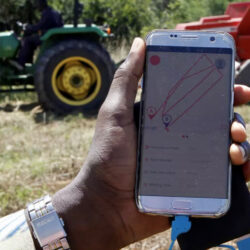WEF in Davos discusses supply chain vulnerability

Addressing supply chain fragility was a key topic of discussion at the recent – online – meeting of the World Economic Forum (WEF) in Davos, Switzerland. Two other important topics were collaboration to ensure food supply and the impact of new technologies and start-ups on current supply chain needs.
Addressing supply chain fragility
COVID-19 has exposed the fragility of the global landscape and industries have adapted in response. During the WEF, Frans van Houten, CEO of Philips, therefore called for increased preparedness, data transparency and coordinated public and private-sector efforts for future pandemics.
One of the most important lessons to be learned from the coronavirus crisis, he said, is the need to ensure that supply requirements can be met, and this means that people must work together: “In order to build capacity you need supply chains that work. When a crisis hits, companies shouldn’t take a ‘me first’ attitude but should look to collaborate to scale the response.”
Companies are currently rethinking their manufacturing and distribution strategies in order to respond to a post-coronavirus world. Kathey Wengel, Executive VP and Chief Global Supply Chain Officer at Johnson & Johnson, described supply chains as “an engine for growth” during the coronavirus chaos, especially when combined with technology. According to her, the need for more innovative, direct delivery channels and improved traceability and resilience has opened up new opportunities.
And while many sectors are tempted to switch to more regionalized production, Herbert Diess, CEO of Volkswagen, believes the future would benefit from companies keeping their global supply routes open: “I think it is much better to work well with China than to isolate China.”
Collaboration to ensure food supply
With developed countries struggling to meet supply needs, food supply chains to developing countries have become even more vulnerable. According to David Beasley, Executive Director of the United Nations World Food Programme, the solution lies in the UN working more closely with private companies and farming communities. They should share their best practices and start using new technologies such as vertical farming and blockchain, he said.
Caretaker Prime Minister of the Netherlands Mark Rutte highlighted the importance of the WEF’s Food Innovation Hubs initiative (pictured) in Asia, Europe, Africa and South America. The initiative connects farms with regional stakeholders to scale up innovations that can address food system challenges. Rutte called it an important opportunity for “global collective action”.
Jeffrey Lu Minfang, Chief Executive Officer of China Mengniu Dairy, drew attention to improvements through the use of data platforms to strengthen supply and demand visibility in order to increase efficiency and reduce waste throughout the supply chain, from growing dairy feedstock to manufacturing and logistics systems.
New supply chain technologies and start-ups
The pandemic has accelerated the adoption of new technologies as companies have been forced to innovate in order to better respond to needs. The WEF therefore led the digital crowdsourcing platform UpLink to connect start-ups united in their work to solve supply chain challenges.
One promising start-up, for example, is Cubex Global, which offers a marketplace for unused shipping containers on existing freight routes. OriginTrail is another company making an impact. It is using blockchain technology to improve certification of medical devices in order to help procurement professionals verify supplies of personal protective equipment (PPE) during the COVID-19 outbreak.
Source: Supply Management










